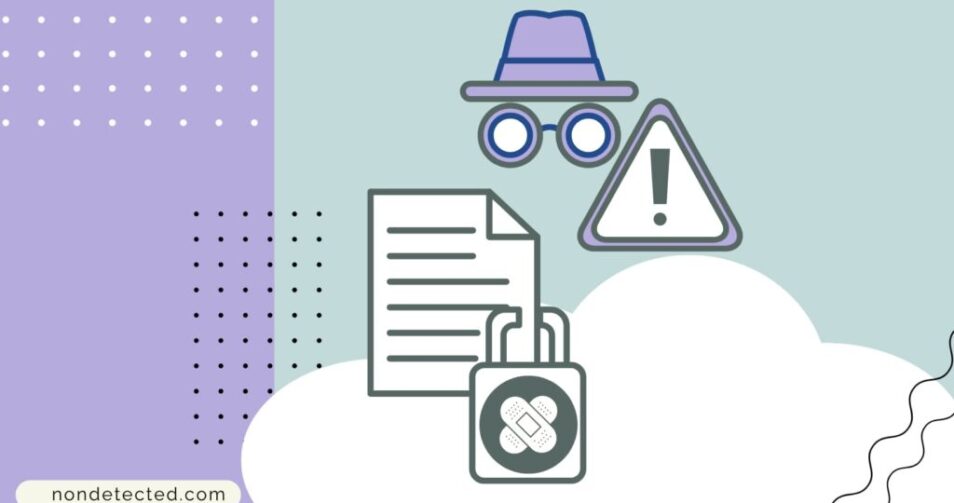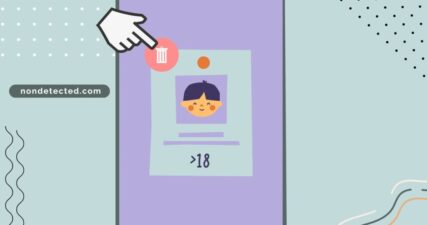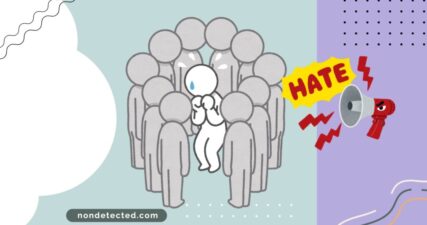How to Delete a Deceased Person’s Online Information?

Undeniably, the loss of a beloved person is one of the most difficult things in our lives that we can face. As if the emotional pressure of their absence is not enough, the Internet sends various notifications or reminders connected with that person. While we would appreciate the presence of their memories in our hearts, the Internet may try intensively to hold onto those memories so that we can feel depressed. Eventually, someone will prefer to remove information about a dead person.
This decision may be overwhelming, and you may feel confused not knowing how to delete the online presence of a dead person; NonDetected is here to offer you its professional services. Not only will we help you with deleting the information, but also provide emotional support and guide you to help you navigate this journey without feeling depressed.
While deleting the whole content of the deceased may be challenging, in the end, you will gain some peace knowing that you protected the dignity and privacy of your loved one.
Risks Associated with Keeping the Deceased Information Online
Several hazards related to maintaining a dead person’s personal information on data clouds may take time to appear. Although they may think that keeping their loved one’s information helps to preserve all the memories connected with them, there are potential unintended consequences that may negatively impact your life and the deceased’s fame.
Identity theft and fraud
One of the most possible serious risks associated with keeping someone’s information after death is identity theft. Unfortunately, cybercriminals target the deceased since there is a higher risk of not being caught. Moreover, some public records about death or birthdays appear later, which means the deceased information can be vulnerable. Scammers may use the chance to apply for some loans, make legal purchases, etc.
Emotional distress and privacy invasion
Keeping the deceased’s digital footage may lead to other risks, such as unsolicited emails or notifications or undesired comments or messages, thus triggering the pain over and over.
If their social accounts remain active, many family members or strangers may continue posting something on their profiles, and some may be innocent, while others spam or make insensitive comments.
Social media profiles and tagged content can linger long after the person is gone, sometimes appearing in random posts or outdated feeds. Help is available to assist with removing or memorializing those entries—helping you manage their digital presence with dignity and care.
Scams targeting family members
Very often, cybercriminals use a dead person’s information to solicit illegal money from relatives. They may pretend to be government agents or companies seeking to settle debts, requesting payment, or posting sensitive information. Scammers may claim that the person has taken money from them previously and, using the relatives’ unstable emotional state, collect money.
Thus, removing the online identities of those who have passed is crucial to protecting your beloved person and other family members.
Reputational risks
No matter how much we want to preserve the memories of our loved ones, there is a certain risk of causing damage to the person’s reputation. The Internet is an unpredictable space, and one may intentionally dig into the Internet and find some content that may negatively impact others’ opinions about the deceased.
Furthermore, private information may become public, creating chaos and misunderstanding.
Misuse of data for marketing or research
Some services, called data brokers, collect and sell Internet users’ information without acknowledgement. The information may be used to create targeted ads or research. Along with personal information, sensitive information will be shared, exposing their digital legacy.
Legacy databases, memorial pages, or obituary listings can remain accessible long after they’ve served their purpose. If you’re dealing with multiple outdated entries, support is available to help remove personal details—ensuring the person’s information is no longer publicly accessible.
Loss of control over legacy
Once some content is exposed on the Internet, it may become challenging for family members to track it down. Anyone having access to the deceased’s private information may manipulate or distort it in a way that may cause irreversible problems.
Harmful or inappropriate content may be posted on the half of the deceased person, or appear on the dark web, where it can be used anyway. So, removing a deceased person’s info on Google or other platforms may help protect their digital legacy and name.
Increased difficulty in managing estate and legal matters
Some websites have stricter policies when it comes to asking to remove the deceased’s online information, making procedures to delete online presence and profiles after death lengthy legal battles. If financial details or digital assets are stored online, accessing them might become challenging, slowing down the process of settling debts, distributing assets, or closing financial accounts.
Exposure to cyberbullying and trolls
If the content of the dead person remains active, it may become a target of unwanted attention, including spamming and cyberbullying, causing extra emotional stray for family members or friends. Unfortunately, few people derive pleasure from causing distress and posting harmful or offensive comments and posts without respecting the deceased’s rights.
There are many other risks related to keeping your beloved person’s information, content, or digital footprint online after death. Not only is the Internet the best place to keep and cherish memories of your loved one, but you may encounter so many unpredictable situations that may cause a lot of stress.
It is highly recommended to apply to professional services and learn how to close online accounts when someone dies to protect their name and dignity.
The Procedure to Get a Dead Person’s Information Removed from the Internet

Upon realizing that there are some serious hazards in trying to keep the deceased’s information, you had better learn how to remove a deceased person from Facebook or other Internet servers.
Here is a step-by-step guide to help you complete the process smoothly.
- Organize and select the information that you want to track down. Make sure what content you want to get removed. You should consider social media accounts, email accounts, online memberships or subscriptions, articles or mentions, photos or videos, sensitive information, etc. Once you have finalized the content you want to remove, prioritize what should be deleted first. Deleting most personal or sensitive information, such as social media accounts, financial details, or misleading content about the deceased, is highly recommended.
- Choose the most trustworthy data removal services in the field. Check the agency’s history success rate, and client testimonials. These are the best indicators of whether it is worth applying for that service. For longer periods, agencies in the market may offer better and more comprehensive services. Moreover, check whether the agency offers services such as guidance on deleting a deceased Facebook account or other accounts. Not all companies deal with such cases as tracking the deceased’s personal information.
- Another important point to consider is the transparency and clarity of the process. Trusting organizations that promise instant solutions to your case is not recommended. Tracking information, especially across various platforms, may take time and resources. Finally, check whether the pricing policy matches your budget limit. However, sometimes not paying that money may cost more in the future.
- Collect all the necessary documents and papers related to the deceased’s digital footprint and present them to the agency. There are some cases that you need to apply to court to get some data removed. Preparing all the documents beforehand may save you time and energy.
- You should always ensure that the content will not reappear on the Internet, so ongoing monitoring is necessary. Some data removal agencies offer such services, so if you want to close the case with peace of mind, you can delegate that task to the professionals or do it yourself.
You can also delete a deceased’s information on your own; however, deleting information permanently is not that easy. Moreover, some data brokers collect data and may sell it to third parties.
Sometimes, deleting this or that social media account is not enough to remove information from servers; you need special search tools to ensure no data is left on the database.
Deleting another person’s data is another challenge since some platforms and websites have strict guidelines on how to remove links about dead people from Google or other platforms. You need to complete dozens of forms to be allowed to start the process.
Even when a page is deleted or memorialized, it may still show up in search results or cached previews. In those cases, assistance is available to request removal of those outdated links—helping ensure the person’s memory isn’t overshadowed by irrelevant or restrictive content.
So, applying to professional services is a much better option.
Reasons Why NonDetected Is the Best Agency for Content Removal
There are several reasons why you should apply to NonDetected to help you delete your beloved one’s information after she or he passed away.
Expertise and Long Experience
NonDetected has specialized in the content removal market for a long time and has gained fame and reputation thanks to its high-quality and customer-oriented services. The team comprises only professionals with a thorough knowledge of websites, data rights, and the processes required to remove content.
Our company gained much experience dealing with various platforms and websites, including social media platforms, data brokers, public records, etc., enabling them to provide comprehensive and proven solutions to your case.
Personalized Services
Each content removal case is different and requires tailored solutions. NonDetected experts offer personalized services based on your case details. Instead of concentrating on generic solutions, we will thoroughly study your case and take all the necessary measures to address your problem fully.
Legal support
Legal intervention is often required to remove content, including filling DMCA takedown notices, issuing cease-and-desist letters, or even suing the website for your rights violations.
Non-detected clients can access legal consultation, ensuring their requests comply with laws and regulations. The team takes all the burden of legal procedures to ensure their effectiveness. Cases with stubborn and uncooperative platforms or content protected by complex laws or international jurisdictions are challenging and time-consuming.
Affordable Prices
Removing information online cost for NonDetected clients is affordable compared to other services in the market. However, it is not at the cost of quality of services but being able to deal with each case effectively and comprehensively.
Time-Saving
Tracking down every instance of your information online and successfully removing it may take time and energy, causing stress and anxiety. Even if you have successfully deleted the original cost, it may reappear after some time, so ongoing monitoring is required.
NonDetected offers services to ensure that no information that can harm or decrease your quality of life may appear on servers without being noticed and removed.
Reputation management
In some cases, content removal cannot bring back the harm caused to one’s reputation. Once the negative content appears, it can negatively impact the operation of that business, causing losses and extra costs. NonDetected and content removal services offer to repair the damage caused to you or your business.
We do not create positive content to increase your reputation among Internet users; we focus on the information REMOVAL.
Final Thoughts
So, if you are looking for how to delete a deceased person’s Facebook account or other content from the Internet, you are recommended to apply for professional help.
Having a long experience dealing with various platforms and websites, they may provide more professional and thorough solutions to your case.
NonDetected is one of the best agencies offering such services, and many satisfied clients are good indicators of the agency’s good reputation.


